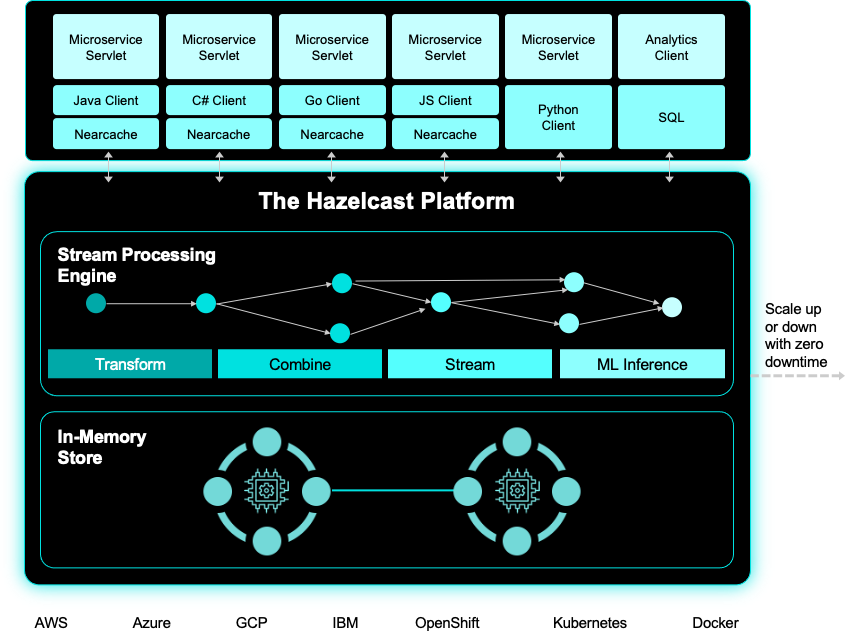Hazelcast Platform 5.0 Boosts Power of Real-Time Intelligent Apps
Real-time intelligent apps get a big boost with Hazelcast Platform 5.0. The update unifies event streams with contextual insights from traditional data stores at speeds up to one billion events per second.
Hazelcast is shipping the latest update to its real-time intelligent applications platform. Hazelcast Platform 5.0 unifies event stream with contextual insights from traditional datastores.
The latest version of the Hazelcast Platform combines the capabilities of a real-time stream processing engine with in-memory computing to deliver a simplified architecture that is highly performant, scalable and reliable, according to Hazelcast CEO Kelly Herrell.
The result: Hazelcast Platform 5.0 enables enterprises to increase actionable insights by unifying event streams with contextual insights from traditional data stores at in-memory speeds of up to one billion events per second with a latency of less than 30 milliseconds, he added.
Under the covers, Hazelcast’s latest updates support transactional, operational and analytical workloads, which provides enterprises a unified platform for cloud, data center and edge. Thanks to its ability to execute transactional, analytical and operational workloads, the platform can act as a single data layer and access point for applications to leverage.
“The reception from customers and industry experts since we announced the Hazelcast Platform has been nothing short of fantastic and highlights the desire for a simplified platform that enables enterprises to seamlessly merge different data workloads,” Herrell added in a statement.

Herrell shared an example use case.
In banking, Hazelcast empowers data processing at the edge, such as ATM machines, to better serve customer needs in real-time. And by simplifying the way organizations gain real-time insights from IoT and edge, hybrid cloud and AI use cases, Hazelcast is giving finance and retail companies like JPMorgan Chase, Charter Communications, and Ellie Mae a way to overcome big data hurdles, Herrell explained.
A look at how the Hazelcast Platform’s architecture supports the real-time enterprise comes from a website description:
Large-scale computations need integration of transactional, operational, and historical data into a single platform. Connecting all the relevant data sources is hard enough, but procuring the compute power and storage space adds another level of complexity. You need these compute-intensive jobs to always complete within stringent SLAs, so you need high speed and efficient use of hardware resources. And you only want the resources you need, only when you need them.
One main focus for Hazelcast Platform is a set of features to help organizations develop and deploy fast and highly-scalable applications – with exceptional support for compute-intensive workloads that require large-scale calculations or simulations.
In this respect, Hazelcast Platform 5.0 enables users to:
- Rapidly develop and deploy distributed applications using familiar programming patterns in SDKs for Java, C#, Go, Node.js, Python and C++.
- Leverage Hazelcast user-defined functions to reuse existing code into a modern, cloud-native architecture.
- Run zero-downtime jobs to ensure completion within SLAs, via elastic clustering, high-availability and multi-DC, dynamic patching, and app redeployment.
- Gain extremely high performance in a cloud-native architecture running as self-managed (bare metal, Kubernetes, Red Hat OpenShift), as a managed service on AWS, Azure, GCP, and at the edge.
Further, to support real-time decision-making, Hazelcast has a low-latency, distributed memory architecture -- for both data and computations.
It also integrates live data streams with historical and operational data and works with popular message brokers, including Apache Kafka, Apache Pulsar, AWS Kinesis, and RabbitMQ. Performance-wise, it can run thousands of queries over billions of live events.
For further speed, it stores indexed data in-memory, which provides users an ‘analytics store,” according to company documents.
Hazelcast Platform 5.0, which has been in beta since summer 2021, is now generally available as an enterprise and open source offering.






